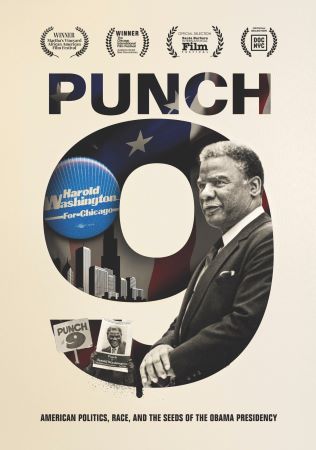
Punch 9 for Harold Washington 2021
Distributed by The Video Project, 145 - 9th St., Suite 230, San Francisco, CA 94103; 800-475-2638
Produced by Joe Winston, Raymond Lambert, and Sonya Jackson
Directed by Joe Winston
Streaming, 103 mins
High School - General Adult
African Americans; Democracy; Government
Date Entered: 04/05/2024
Reviewed by Russell A. Hall, Reference and Instruction Librarian, Penn State EriePunch 9 for Harold Washington is a well-crafted documentary detailing the historical events surrounding Harold Washington's campaign to become the first African American mayor of Chicago, as well as his tenure in office. It offers an insightful examination of the difficulties faced by an outsider politician battling a political machine. It also shows the racial issues baked into city politics and the importance of coalition-building and retail politicking to combat these problems.
Using interviews and assorted video footage, Punch 9 for Harold Washington establishes the transformative role of Harold Washington in Chicago politics, and the politics of the nation. The film gives a good, if quick, overview of how the city functioned under long-time political boss Richard J. Daley (in office from 1955 until his death in 1976). Daley’s successors did not change much in terms of the Democratic machine, though it can be argued that Jane Byrne, the first female mayor of a major city in the U.S., did make efforts to that end.
It took Harold Washington to substantially alter the governance of Chicago. After chronicling Washington’s campaign against Byrne in the primary, through excellent editing and direction, the film shines in demonstrating the racial animus present in the general election, where many of Mayor Daley’s machine politicians defected to the Republican candidate. It also does a superb job of showing Washington’s difficulties with the aldermen of the city council. Though Punch 9 does show a major misstep by Washington in these dealings, one shortcoming of the film is its tendency to portray him in an overly favorable light, possibly to burnish Washington’s already impressive legacy. This is easily forgiven though, as it is common in biographical films.
Punch 9 for Harold Washington adroitly relates the political history of the 1980s in Chicago. It would be of terrific use for courses studying the politics of that specific time and place. Further, classes studying city governments in the post-Civil Rights era could find substantial value in this film. And of course, Punch 9 for Harold Washington would be superb supplemental material for groups learning about how African American politicians and their constituents had to (and continue to) work extra hard to overcome the entrenched racism in our governmental systems.
Awards: Martha's Vineyard Africa-American Film Festival, Best Documentary; Chicago International Film Festival, Audience Award, Best Documentary; Library of Congress Lavine / Ken Burns Prize
Published and licensed under the Creative Commons Attribution 4.0 license. Anyone can use these reviews, so long as they comply with the terms of the license.